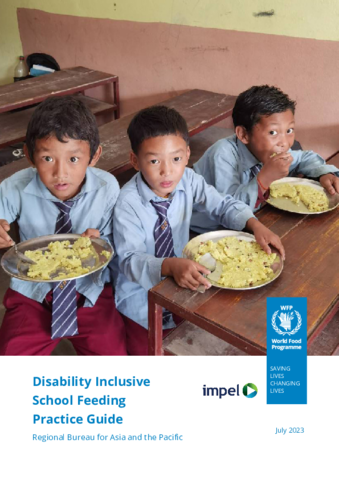
This paper is intended to enhance understanding of the links between school feeding and disability inclusion. The goal is to identify and provide entry points to help address the barriers experienced by children and young persons with disabilities (and their families) when interacting with school feeding programmes. This is relevant both in terms of accessing public education, where school feeding is offered, and benefitting from school-based feeding programmes. The primary audience for this paper is WFP staff in the field and country office level under the Regional Bureau for Asia and the Pacific, to provide guidance on how to engage with government, donors and communities to support and facilitate action to ensure children with disabilities are included in school feeding. The paper also aims to help WFP staff to consider creative options and approaches that could lead to more inclusive school feeding practices generally. The secondary audiences are partners, particularly related to providing and/or supporting services in education, water, sanitation and hygiene (WASH), infrastructure and the food supply chain. The remainder of the introduction gives a short overview of the link between disability, nutrition and school feeding. Section 2 outlines barriers commonly facing children and young persons with disabilities in accessing school-based feeding programmes. Section 3 provides key principles and building blocks for inclusion, as well as outlining considerations and entry points for strengthening disability inclusion at each stage of the school feeding programme cycle. Three annexes include further reading on disability inclusion, school based feeding and nutrition, as well as guidance around partnering with organizations of persons with disabilities (OPDs) and the Washington Group Question Sets.
